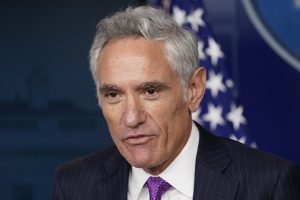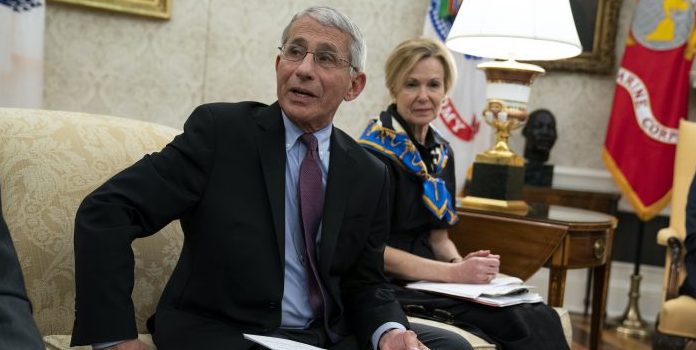Newly revealed emails show the conflicting advice given to President Donald Trump last year while the country struggled with the coronavirus pandemic, according to BuzzFeed News.

The emails, obtained by Charles Seife, a New York University journalism professor, are from two of Trump’s top COVID advisors, Drs. Anthony Fauci and Deborah Birx, and largely cover the rift between the two and presidential science advisor Dr. Scott Atlas.
Atlas, a fellow at Stanford’s Hoover Institution and a graduate of the University of Chicago Pritzker School of Medicine, was brought on to offer alternatives to the failed lockdowns that were intended to control the COVID pandemic.
“I am more convinced than ever the dangers of Dr. Atlas’ views on the pandemic,” Birx wrote to Fauci, according to Buzzfeed.
Anthony Fauci and Deborah Birx warned top officials about the “dangers” of Scott Atlas last summer, emails show https://t.co/fe3AHpe1iF
— BuzzFeed News (@BuzzFeedNews) July 13, 2021
She accused Atlas of “providing information not based on data or knowledge of pandemics — nor pandemic responses on the ground but by personal opinion formed by cherry picking data from nonpeer reviewed COVID publications.”
“This is dangerous and a true threat to a comprehensive and critical response to this pandemic,” Birx added. “Dr. Atlas views appeal to a subsection of American citizens and if allowed to gain traction will reverse months of incredibly hard won gains.”
“I agree and share your concerns,” replied Fauci. “He is a very clever guy and knows the literature (in his own way). It is in the interpretation of the literature that we differ.”
Birx and Fauci were concerned about Atlas’s championing of “herd immunity” with the president as an alternative to lockdowns and masking.
Herd immunity relies upon 80-85% of the healthy population to have been exposed to the virus to be effective.
Fauci claimed that Atlas wanted to let the pandemic “play out.”
Atlas, said Fauci in an email, “passes over the obvious connection between letting the pandemic play out and the likelihood that we will be killing a lot of people (not just nursing home inhabitants) along the way.”
Reporting by Buzzfeed in the fall of 2020 said a herd immunity plan touted by several epidemiologists — Jay Bhattacharya of Stanford University, Martin Kulldorff of Harvard University, and Sunetra Gupta of Oxford University — was allegedly presented to the White House in October with Atlas’s help.
“Those who are not vulnerable should immediately be allowed to resume life as normal,” read a letter published at the time by the plan’s authors, known as the Great Barrington Declaration, who argued that the economic and social damaged suffered by lockdowns was too great.
But Atlas denied advocating for herd immunity.
“I do not advocate any ‘strategy’ of achieving herd immunity and have never advised the president to pursue that,” Atlas told BuzzFeed News by email. “To say that was a strategy even suggested at our meeting would be a gross misinterpretation.”
Indeed, historically, the herd immunity plan was never tried and the administration relied upon the development of the vaccines that have thus far started to establish some control over the virus in 2021.
The administration at the time was locked in a battle to try to get some parts of the country open again, such as schools, says Buzzfeed.
But Brix and Fauci were more cautious.
“We are only now collecting data that children actually do get readily infected. We need to do the phylogenetic studies to show (or not) just where they get infected,” Fauci wrote. “However, we cannot assume right now that school is not a source of super spread. That is a dangerous and irrevocable assumption.”
Why the CDC waited so long to study the effects of the virus on children was not addressed in the emails by Fauci and Birx, but echoes other failures by the CDC to be consistent when following science.
The Center for Disease Control and the World Health Organization have differed on whether children should be vaccinated with the CDC opting for vaccinations for kids over 12 years while the WHO says more studies need to be done.
Despite the low number of vaccinations under the age of 18 years, federal data shows that nearly half of all public schools were open in March for full-time, face-to-face classes, even as the numbers of infected people continued to plunge.
The data about the effectiveness of lockdowns as a means to control pandemics is thus far mixed with some studies showing that lockdowns were effective in controlling the spread of the Covid virus and other studies showing no effect.
However, most studies agree that the lockdowns have to be measured against the costs of such measures.
“Taken together,” says a report by the science trade magazine Nature, “the social distancing and movement-restriction measures discussed above can therefore be seen as the ‘nuclear option’ of NPIs: highly effective but causing substantial collateral damages to society, the economy, trade and human rights.”

